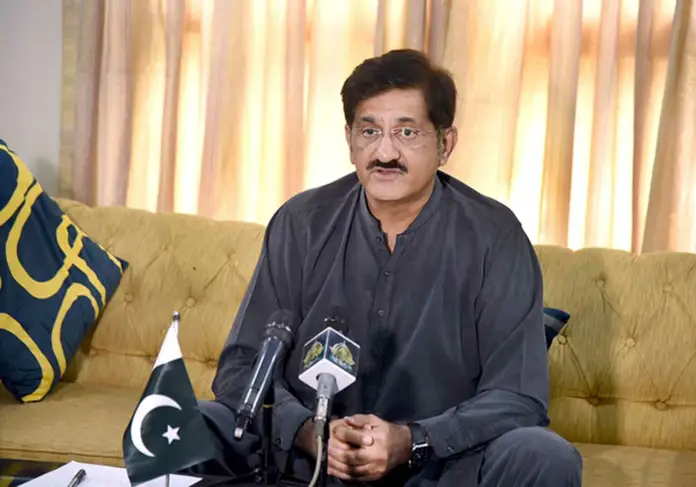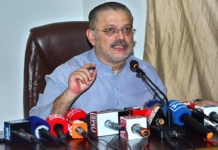Sindh Chief Minister Syed Murad Ali Shah, in his meeting with World Bank Country Director Najy Benhassine, presented the ‘Sindh case’ relating to the devastations caused by floods in the province and he was successful in getting approval of $92 million. The sum will be diverted from different projects of the bank for relief and rehabilitation of the flood-affected people.
The chief minister also presented a case for the rehabilitation of the irrigation and drainage network, which would cost around $1 billion, for which the World Bank team would assess the damages and present the case to the board for approval.
The meeting was attended by KMC Administrator Murtaza Wahab, Chief Secretary Sohail Rajput, P&D Chairman Hassan Naqvi, SRB Chairman Asif Memon, and the secretaries concerned. The World Bank team included Operations Manager Gailius Draugelis, Sector Leader Abdul Razak, Programme Leader Tobias, Senior Specialist Ahsan Tehsin, Kamran Akhtar, Aleed Anwar, Anjum Ahmed and others, who joined via video link.
The chief minister said that Sindh had received an unprecedented amount of rainfall in the monsoon season from July-August 2022. “The magnitude of it can be assessed from the fact that it has rained more than 308 per cent above the average rainfall in July and 784 present above the average rainfall in August,” he said and added that flash floods of 2010 had affected only Right Bank of Indus River and were mainly riverine caused by heavy outflows from the north of Pakistan, which resulted in the death of 414 people. He said the floods of 2011 were also the outcome of heavy rainfalls, impacting mostly the Left Bank of the Indus River.
Murad said that in the wake of the 2011 floods, the Asian Development Bank (ADB) and the World Bank (WB) had conducted a ‘damage and needs assessment’ (DNA) and reported that out of a total of Rs324.5 billion damage estimates of the entire country, Sindh suffered the most to the extent of Rs310.7 billion.
The CM said that unfortunately, the current rainfalls had proved more destructive with a widespread impact on all 30 districts of the province, which had been directly affected. “This unprecedented rainfall has not only caused the loss of life but has damaged properties, infrastructure, livestock, and agriculture crops at an enormous scale,” he said and added the damage was still ongoing.
He said that preliminary estimates suggested a loss of more than Rs860 billion to the province. He added that it was believed that the actual losses were much more than the initial estimates, which would be revealed after a comprehensive and systematic survey of damages in the entire province.
According to Murad, his government had declared 23 districts, including their 101 talukas and 5,718 deaths, as calamity-hit areas. Over 1.5 million houses, 11,734 animals, and 3,171,726 acres of crops have been damaged completely, he said, adding that his government was in dire need of funds to rescue, revive and rehabilitate the devastated sectors.
He proposed that $57 million may be re-appropriated from World Bank-funded projects, including $27 million from CLICK, $8 million from agriculture projects, and Rs22 billion from the PDMA. He added that these funds would be diverted for flood relief.
Murad said that another $35 million, including $25 million from KWSSIP and $10 million from the SELECT (Education) project could be re-appropriated for rehabilitation works.
At this, the World Bank country director agreed to the chief minister’s proposal and said that they would re-appropriate the amount and issue the advice shortly.
P&D Chairman Hassan Naqvi, briefing the meeting on the damages caused to houses, said that 1.5 million houses would be reconstructed to rehabilitate the people who lost their homes. The chief minister said that with the reconstruction of 1.5 million houses, employment opportunities would generate. “This will help rehabilitate the affected people financially.”
A World Bank representative, giving a presentation to the chief minister, said that climate-friendly reconstruction technologies to minimise climate risk would be adopted.
He suggested flood-resistant housing solutions, based on a standard core unit for which training to artisans and beneficiaries would be imparted.
The chief minister said that at least $500 million were required to reconstruct the collapsed houses. At this, the World Bank country chief said that the bank would assess the damaged houses and then put up their recommendations along with the provincial government’s request in their board meeting for approval.







